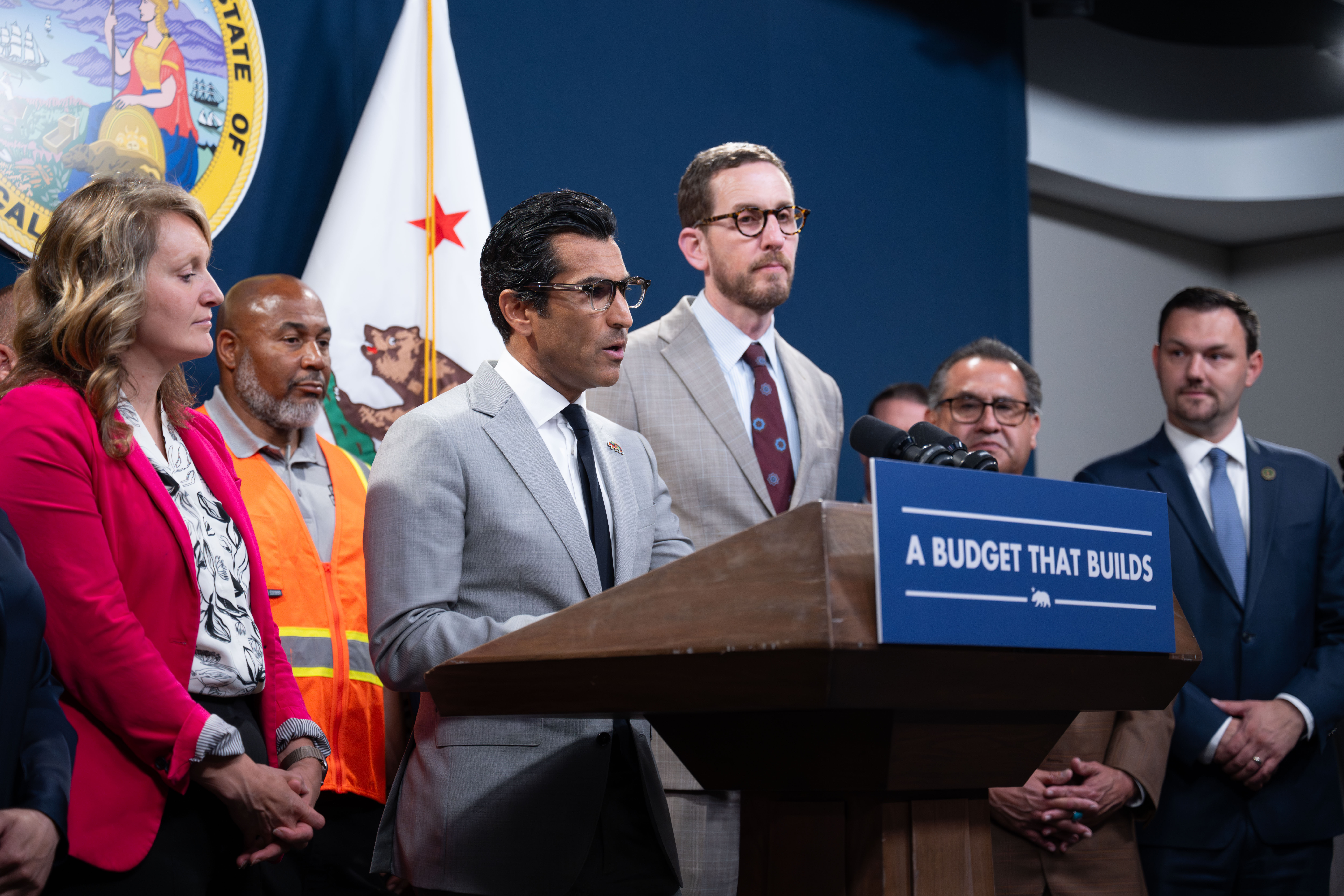Speaker Rivas and the Assembly took fast action to address the No. 1 cost-driver for working families: the price of owning or renting a home. Lawmakers moved quickly to pass bipartisan solutions that will make it easier to build housing where Californian
- Nick Miller
- Communications Director
- 916-319-2029
- Nick.Miller@asm.ca.gov
SACRAMENTO — Speaker Robert Rivas kicked-off this two-year legislative session with an urgent message for his colleagues:
“Affordable decent housing isn’t just a policy challenge: It’s the civil rights struggle of our time,” Speaker Rivas said during the first day of session on December 2. “Every worker has the right to live near their jobs in the communities they help build, serve and enrich. And we have a responsibility to make that a reality.”
Immediately, the Assembly hit the ground running and quickly passed significant, landmark new housing affordability laws. These solutions will alter the trajectory of the housing affordability crisis, leading to faster construction of homes, less red tape and fewer delays, and more affordable housing options and opportunity for all Californians.

Delivering on Housing and Affordability Solutions in a Matter of Months
Californians clearly expect their leaders to accelerate the construction of homes to lower costs and increase housing options.
Respondents to a Berkeley/IGS poll from this past May said the most important issue California’s leaders should address this year is the cost of living and housing affordability. And a UC Irvine poll from July also showed Californians view housing as the top priority for state funding.
The Assembly introduced two critical bills very early this session. On January 23, the Assembly debuted AB 306 (Rivas, Schultz), which creates more certainty for home construction by reducing delays and cost overruns, leading to lower costs; and AB 609 (Wicks), which streamlines the permitting process for housing in urban areas and will lead to more environmentally friendly infill housing near places of employment, reducing Californian’s daily driving and saving commuters money.
These landmark policies passed the Assembly on April 1, with urgency and bipartisan support, and later made it through the full Legislature and were signed into law by the Governor in July as part of this year’s budget.
“Workers, business owners and all Californians deserve the opportunity to live near their jobs, in the communities they help build. I’m committed to making that a reality,” Speaker Rivas said in June. “This budget delivers smart, sustainable and transformative housing solutions that cut red tape and streamline approvals — because building more homes, faster, is essential to making California more affordable and expanding opportunity for all.”
The Year of Housing Affordability
In this “Year of Housing Affordability,” Assembly Democrats took a major step forward, introducing and passing several key new laws, including:
- Streamlining Housing Development: Passed legislation to fast-track housing construction by reducing regulatory barriers, modernizing CEQA, and cutting costs — at no fiscal cost to the state.
- Improving Project Approval Time: Empowers homeowners and developers to use licensed third-party professionals for plan checks when local agencies exceed 30-day review windows, speeding up the building process for small-scale housing.
- Holding State Agencies Accountable: Requires state departments reviewing post-entitlement housing permits to meet the same deadlines already imposed on local agencies.
- Investing in Affordable Housing: Allocated $500 million for the Low-Income Housing Tax Credits (LIHTC) and $120 million for multifamily housing developments.
- Combatting Homelessness: Invested 500 million through the Homeless Housing, Assistance, and Prevention (HHAP) program to provide shelter and services for unhoused Californians.
- Preventing Cost Increases for Future Housing: Enacted a temporary moratorium (2025–2031) on new state and local residential building standards that could increase construction costs, ensuring more affordability in the development process.
- Boosting ADU Development: Expedites the development of accessory dwelling units (ADUs) in the Coastal Zone to increase the availability of housing in high cost areas.
The reforms passed this year mark a turning point in California’s housing crisis. With faster approvals, stronger investments and fewer barriers to building, Democrats in the Assembly are delivering the bold action Californians have been demanding to lower costs and expand housing options.
The Assembly has laid the groundwork for lasting change, and remains committed to advancing policies that make our state more affordable, more livable, and more equitable for all Californians.
###
For more information, follow Speaker Robert Rivas at the following social media channels:
Instagram: @caspeakerrivas
Facebook: www.facebook.com/CASpeakerRivas/